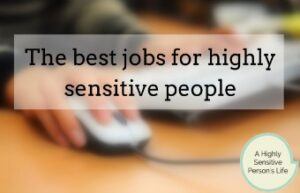Introduction
About one in six people is born highly sensitive. This is a normal treat. It is found in 15 to 17% of the population–too many to be a disorder, but not enough to be well understood by the majority of those around you. I can attest to this myself as I am an HSP, although I found out very late in life. HSP’s are often very precise and creative and therefore the ideal employees. That is on the condition that highly sensitive people are recognized and work in a safe environment.
Therefore I am giving 8 tips below for highly sensitive people and their work environment and how to get the best out of themselves. Maybe you get the best when being your own boss. Check out the opportunity at the end!
What is high sensitivity anyway?
The concept was introduced by the American psychologist Dr. Elaine N. Aron, who first published about it in 1996 and wrote many books about it. According to Aron, this sensitivity is innate and genetically determined. Her studies showed that some people are more stimulated than others, they are more sensitive to emotions, pain, and pleasure. They are also more sensitive to external stimuli, such as sounds and impressions. Because they adapt to their innate quality, they often seek peace and quiet.
Characteristics of people who are highly sensitive
 They are aware of subtle signals in the environment;
They are aware of subtle signals in the environment;
They are influenced by the moods of others;
During busy days they have a greater need to retreat to bed, a dark room, or a place where they can be alone undisturbed;
They are easily overwhelmed by things like bright lights, strong smells, or loud sirens;
They have a rich and complex inner world;
They are conscientious;
They feel rushed when they have a lot to do in a short time;
They get irritated when people try to make them do too much at once;
Changes in life upset them;
When they have to perform or are watched, they become so tense that their performance is much less than usual.
Highly sensitive and work
A magazine featured a good interview with Elaine Aron about high sensitivity (Highly Sensitive Person) in the workplace. It states, for example, what you can do with a highly sensitive person. “In the workplace, we really lose if we don’t build environments that are conducive to HSP success. Highly sensitive individuals in the workplace can bring many benefits: they are more aware of subtleties, can pick up on potential problems before they become serious, and can analyze problems more deeply. They are also more likely to make more correct interpretations of social situations, which is of course beneficial in a sales environment. And yet most sales environments naturally push HSPs away because they are simply not built to support them.”
Ideal employees
In her book from 1991, she also said something similar about employees who are highly sensitive. They are intuitive visionaries, able to see the big picture, creative, aware and attentive to the needs of others, good influences on the social climate, vigilant of quality, very conscientious, loyal, able to detect subtleties in the environment and interpersonal communication pick up and often gifted. In short, they are ideal employees.
Create a healthy working environment
According to Janine Ramsey, founder of Sensitivity Style, it is important that an employer is aware of the qualities of the HSP and takes the characteristics seriously. When that happens, such a working environment brings out the best in the person. This means that while sensitive workers may be the first to fall if the workplace is unhealthy, they will also be the first to thrive if the environment is healthy. Organizations that create a healthy environment and implement positive interventions for employees will see the greatest return on investment from their highly sensitive and observant employees.” Here is what the HSP can do.
Tip 1: Look for a workplace where you can perform your tasks at your own pace.
HSPs go for quality rather than quantity. You feel good when you can deliver quality work without being put under a lot of pressure.
Tip 2: Avoid professions that generally do not suit you
HSPs thrive best in a pleasant and low-stimulus environment in which they can work independently without an excessive workload. The professions below are probably less suitable for the average HSP:
 Unskilled and low paid work
Unskilled and low paid work
This often involves production work, factory work, and simple administrative work. HSPs lose a sense of meaning at some point and burn out as a result.
Competitive work environment
Constantly high work pressure is too much for HSPs and can lead to overstrain or burnout.
Impersonal work environment and large companies
HSPs like personal contact and work on the basis of trust. This is often more difficult in large companies.
Representative or seller
HSPs are often too honest and gentle for these positions. They don’t like to pressure people to sell as quickly as possible. They also find it difficult to place more emphasis on the positive points of a product or service and to emphasize the disadvantages less.
Executive functions
HSPs can of course be good leaders, but for some, the pressure is too great. HSPs are more often advisors.
Tip 3: Research professions that suit HSPs
Many HSPs work in independent professions, in which they can be creative (artist, writer, journalist, scientist). Examples of professions where HSPs can come into their own include consultant, writer, journalist, philosopher, historian, judge, artist, scientist, psychologist, therapist, teacher, theologian, director, actor, architect, and inventor. Let’s take a closer look at some features:
Artist

HSPs often have a good eye for beauty and harmony.
Research
HSPs are creative thinkers. They work precisely and go for the quality. This makes HSPs good researchers (science, but also beyond).
Service professions
Many HSPs have a subservient attitude and are aware of the suffering of others. They more often choose professions such as general practitioner, nurse, care worker, or social worker. The pitfall with these kinds of jobs is that the HSP starts to empathize too much and becomes overstimulated. There is a high workload in these professions, which does not really go hand in hand with an HSP.
Another way in which you can exercise a service profession is to work as a specialized therapist or coach. HSPs can often use their creativity, intuition, and sensitivity to sense what someone else needs.
Lecturer
Highly sensitive teachers have a good eye for what concerns the students. Teaching is their calling. However, it is a challenging, tough profession, so the HSP must carefully monitor his limits.
Nature or animals
HSPs feel a strong connection with nature and like to withdraw to go for a walk and recharge. You can decide to work as a forest ranger, nature guide, or tour guide. Staying in a natural environment is less stressful than office work because you have enough exercise and fresh air and there is a variety of surroundings. Others prefer to work with animals and become a zookeeper, veterinarians, shelter workers, zoo workers, or dog walkers.
Entrepreneurship
Entrepreneurship gives HSPs the freedom and independence to do their own thing and also get paid for it. When they have built up sufficient self-knowledge and self-confidence, they dare to take the step. You just have to pay attention that as an HSP you realize that you are good at the creative part and the ideas; elaboration and marketing can be tricky. So try to think carefully about what suits you and what doesn’t. A solution may be to seek collaboration with people who are good at things that are not suitable for you as an HSP.
Househusband or wife
One can be very happy at home and find satisfaction in caring for the family. However, it can be frustrating for an HSP to feel that many of your qualities remain unused.
Tip 4: Take enough breaks
Make sure you take stimulus-free breaks (no computer, no conversations, etc.). For example, go outside and eat your sandwiches while walking. Enjoy the fresh air and the environment.
Tip 5: Stop multitasking!
Multitasking is inefficient and exhausting. As an HSP it is better to avoid it so that you can handle more and get more done.
Tip 6: Buy noise-canceling headphones
You can concentrate better and prevent overstimulation at the office by wearing noise-canceling headphones. Play calm music without lyrics. The headphones also come in handy on public transport!
Tip 7: Go for intrinsic motivation
Look for work that really makes you happy and that gives you energy (admittedly, that can be a long process). If you work somewhere just for the money, you won’t last long. However, you also just have to earn a living. If you haven’t found the job that excites you yet, make sure you do what really makes you happy in your spare time. In the end, try to make money from your calling.
Tip 8: Create ideal working conditions
You thrive best in a low-stimulus environment. A calm, quiet space (tip 6) where you work with a few colleagues is ideal. Hopefully natural light will enter and you will not be dependent on the fluorescent tube.
Ultimate way out for HSP’s
Start for yourself and get your own business on the internet. One of the most popular options is affiliate marketing. Find the world’s best program and full description by clicking here!


OMG I just realized today that I am an HSP! No wonder that I always hated my jobs, my colleagues that I found stupid. I’ve always wanted a job that I can create and thrive on. Your perspectives and the solutions that you give are very insightful. I intend to apply them in my life and my business from now on. I especially liked when you talked about getting headphones to focus, I really need that!
Ok, you might be an HSP, but do not rely on this article alone. Just to make sure, I advise you to do the test on the website of Mrs. Aron as well and you will know more. If you score 14 or more, you could be HSP. My score was 21! If you are, then look back at your life and find out why things happened the way they did and learn from it.
I had a colleague who seemed to be shy… he also wasn’t performing well, and we all thought that he just did not fit for the job…
Later I have found out that he was having an issue, but was not sure exactly what issues it was.
I wanted to help him but didn’t realize that he was just high sensitive person.. because from what I read here in your article, it perfectly matches.
Well, I hope he found some job in the research department since this looks like the environment he might like. He was creative but couldn’t be pushed too much.
I remember when there was no high workload, he always brought perfect results.
So he was not shy, only high sensitive person. Really interesting and I am sure we are going to need such a person in our company, soon.
The thing is that people are not aware of HSP’s enough yet. 85% of people will not recognize them for what they are. They will think that person is shy, introverted (which is not a bad thing!), and even stubborn and contrary to anything. This is not intentional as HSP is an innate characteristic. maybe the person in question did not even know about it. Just remember it is only 25 years ago that this feature was first identified.